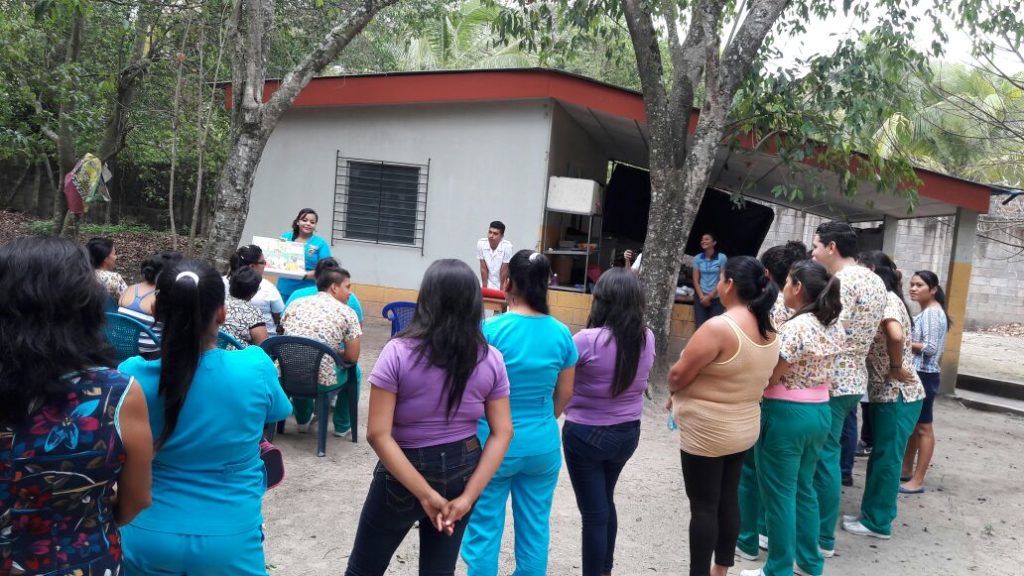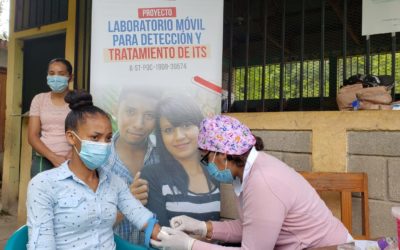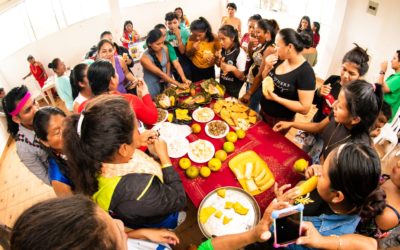Understanding health from different areas, based on the circumstances in which people are born and develop their lives, health systems, public policy, environmental factors, among others, is to understand it from the approach posed by Ecohealth. The health and living conditions of pregnant women, newborns and children up to two years of age can be viewed from this systemic perspective.
This comprehensive vision takes into account the diversity of factors that affect the presence or absence of any disease in humans and not only contemplates that people’s health depends on the effects of bacteria, viruses, parasites or toxic substances. Ecohealth addresses what are known as social determinants of health, which according to the World Health Organization (WHO) “are the circumstances in which people are born, grow, live, work and age, including the health system. These circumstances are the result of the distribution of money, power and resources on a global, national and local level, which in turn depends on the policies adopted ”.
These determinants, which address most of the health inequities that exist within and between countries, can be avoided or mitigated. In accordance with the provisions of the Commission on Determinants of Health, the recommendations to overcome these gaps are related to improving daily living conditions; fight against the unequal distribution of power, money and resources and the measurement and analysis of the problem.
To analyze the determinants we must understand that there are unique, particular and general dimensions that condition the health status of individuals and societies. The singular dimensions refer to the human being as an individuality or to the microorganism as an isolated entity. The laws that move in this dimension are those of biology, but it interacts with the other dimensions. The symptoms of a disease, the clinical expressions of a contagion, the health conditions of each organism are part of this dimension. For example, nutritional status, existing pathologies, the condition of being pregnant or nursing, are important aspects to take into account, so that therapeutic interventions are appropriate.
The particular dimensions consider the human being from a collective point of view. As a family, social class or work group and the relationships between these groups, with society and nature. The laws that govern this dimension move in the social sciences, whose domain allows to discover the social and economic particularities of said human groups. The quality of public transport, the level of economic income, access to basic services, are examples of these particularities of each group, which affect people’s health status. The solutions that are usually given to this type of determinant are temporary and ephemeral.
The general dimension is related to the characteristics of society, in which a person, a family, a community are located. Social and health policies fall into this area and its efficiency and ability to change an adverse situation is what must be analyzed. The budget allocated to health systems, prevention programs, the relevance of public policy, are some examples of the aspects that are part of this dimension.
The profound transformations that are required to overcome health inequities are located in the general dimension, by addressing structural and permanent aspects. The Resolution of the 62nd World Health Assembly analyzed the recommendations of the Commission on Determinants of Health and exhorted the member states of the WHO to fight against the health gaps in the countries and among them through political commitment, on the fundamental principle of the national interest to “correct the inequalities in a generation ”. Likewise, to develop and apply objectives and strategies to improve public health, focusing on health inequities; and to consider health equity in all national policies regarding the social determinants of health. TO establish comprehensive and universal social protection policies that provide for the promotion of health, the prevention of morbidity and health care, and that promote the universal availability and access to goods and services essential for the health and well-being of women. societies.

Within the work context of the Waal Foundation, in its objective of generating a culture of prevention, the Ecosalud approach is highly relevant because its application is universal and can be adapted to any type of relationship between human beings, society , nature, health and life. The current global situation derived from the pandemic by the SARS -CoV-2 shows how the social determinants of health establish a series of differences and possibilities between pregnant women, their babies and children up to two years of age, both in prevention tasks and if they are infected with it virus. Similarly, this approach allows us to take into account the economic and space resources that the most vulnerable population has to be able to isolate themselves in the case of being at risk of contagion or in the possibilities of a woman to continue breastfeeding, if she is infected by the virus, to name a few examples.
The WHO established a series of specific recommendations for the management of pregnant women and their care in medical services, in the scenario of the pandemic. One of them establishes that at the time of delivery, the woman must communicate her positive or suspected coronavirus picture, in order to allow the hospital center to prepare to care for her in an exclusive area to avoid contagion to medical professionals and patients. other patients. In the case of being accompanied by your partner or a relative, “It is required that the support person must be asymptomatic, not belong to the risk group for morbidity of the disease, must have no history of close contact or coexistence with people suspected or diagnosed with COVID-19”, says the guide “Recommendations for the comprehensive care of pregnant women and newborns ” issued by the Pan American Health Organization (PAHO). The document also recommends natural childbirth and the presence of a team made up of various specialists, such as obstetricians, neonatologists and experts in intensive care for women and newborns with suspected or confirmed COVID-19 infection.
The economic and health conditions of pregnant women who should follow these recommendations are not similar within the same geographic nucleus, for example a city, or the gaps are even greater between cities and rural areas. The social and economic particularities are evident in these cases and are decisive for the worsening or recovery of a pregnant woman with COVID-19, since not all healthcare centers have the capacity to offer a service that is essential at this time.
Another aspect in which health inequities are evident and the need to analyze health from the Ecohealth approach is related to the immune system. It is known that for humans, and particularly for pregnant women and children, the good conditions of the immune system are essential to avoid infectious diseases or for the body to be able to fight in the best way against them, in case to catch it. It is also known that a pregnant woman’s immune system “is generally suppressed. We know that with other types of viruses, such as influenza (flu), pregnant women have a higher risk of illness. “
The Ecohealth approach invites us to think that the characteristics of the immune system do not depend only on biological or physiological variables of the pregnant woman and in general of the human being, but are closely related to the social, economic and environmental conditions of the person and their family. These conditions have to do with the access, availability and consumption of nutritious and balanced food, an aspect that people with low resources, especially in urban areas, cannot fulfill. There is sufficient evidence that infectious diseases, as well as those of a nutritional nature, compromise more low-income social groups and the population with less access to the services that an urban or rural locality can offer. It is also related to adequate rest and hours of sleep and with the emotional stability of the pregnant woman and the children, hence the importance of maintaining harmonious family relationships and caring for the most vulnerable in society.
Exposure to environmental pollutants resulting from industry, vehicle loading and deforestation also compromises the immune system, making mothers and children more vulnerable to respiratory diseases.
The COVID-19 pandemic has highlighted this unfortunate reality. Facing the pandemic with the drag of this weakness and with the state financial crisis in some countries has been a powerful obstacle to controlling it. The concentration of the few existing resources for the control of COVID-19 is preventing the programs from being fulfilled and meeting the needs of women of childbearing age, such as the supply of contraceptive methods (MAC) and the immediate delivery of emergency oral contraception (ECP).
And if we turn to the Resolution of the 62nd World Health Assembly, mentioned above, the exhortations made to the member states of the WHO, clearly ask that governments should contribute to the improvement of daily living conditions, which favors health and social well-being throughout life, involving all relevant actors, and in particular civil society and the private sector. In the same way, it must contribute to the emancipation of individuals and groups, especially marginalized groups, so that measures are taken to improve the social conditions that affect their health.
Generate new scientific methods and data, or make use of existing ones, adapting them to national contexts in order to address the determinants and social gradients of health, as well as health inequities.
This resolution was issued and approved in 2009, eleven years later the world health systems, with some exceptions, are a reflection of the non-observance of these recommendations, in the midst of an extreme health situation, in which social and economic inequalities within countries and each other are making a difference to face the coronavirus pandemic. Pregnant women, newborns and children in early childhood are among the most vulnerable groups, analyzing their situation from the comprehensive approach of Ecoshealth, therefore the response to their situation must also be comprehensive and structural.



